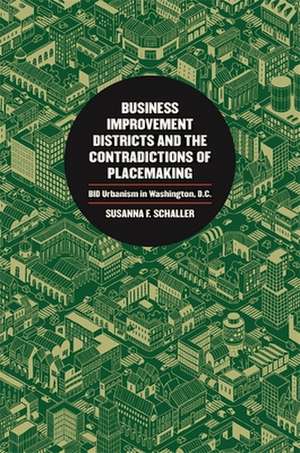Business Improvement Districts and the Contradictions of Placemaking
Autor Susanna F. Schalleren Limba Engleză Hardback – iul 2019
Schaller reveals the contradictions embedded in the BID model. For the last thirty years, BID advocates have engaged in effective and persuasive storytelling; as a result, many policy makers and planners perpetuate the BID narrative without examining the institution and the inequities it has wrought. Schaller sheds light on these oversights, thus fostering a critical discussion of BIDs and their collective influence on future urban landscapes.
Preț: 450.44 lei
Nou
Puncte Express: 676
Preț estimativ în valută:
86.20€ • 89.48$ • 71.88£
86.20€ • 89.48$ • 71.88£
Carte tipărită la comandă
Livrare economică 25 martie-08 aprilie
Preluare comenzi: 021 569.72.76
Specificații
ISBN-13: 9780820355160
ISBN-10: 082035516X
Pagini: 300
Dimensiuni: 157 x 235 x 22 mm
Greutate: 0.64 kg
Editura: University of Georgia Press
ISBN-10: 082035516X
Pagini: 300
Dimensiuni: 157 x 235 x 22 mm
Greutate: 0.64 kg
Editura: University of Georgia Press
Notă biografică
SUSANNA F. SCHALLER is an associate professor in urban studies, planning, and administration in the Division of Interdisciplinary Studies at the City College of New York, CUNY.
Descriere
Draws on more than fifteen years of research to present a direct, focused engagement with both the planning history that shaped Washington, D.C.'s landscape and the intricacies of everyday life, politics, and planning practice as they relate to business improvement districts.
